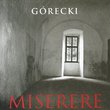| All Artists: Vassily Primakov Title: Dances & Impromptus Members Wishing: 0 Total Copies: 0 Label: Bridge Original Release Date: 1/1/2010 Re-Release Date: 5/11/2010 Genres: New Age, Classical Styles: Instrumental, Historical Periods, Classical (c.1770-1830) Number of Discs: 1 SwapaCD Credits: 1 UPC: 090404932724 |
Search - Vassily Primakov :: Dances & Impromptus
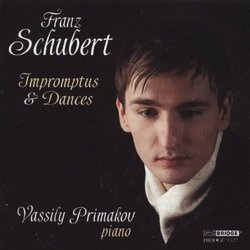 | Vassily Primakov Dances & Impromptus Genres: New Age, Classical
|
Larger Image |
CD DetailsSimilarly Requested CDs
|
CD ReviewsVassily Primakov: Schubert Impromptus, Three Sets Of Piano D Dan Fee | Berkeley, CA USA | 06/26/2010 (5 out of 5 stars) "For starters, fair disclosure: I am a fan of pianist Vassily Primakov, definitely. His Chopin concertos bowled me over and then some. I also went gaga for his readings of: Dvorak piano concerto, Tchaikovsky Seasons and Grand Sonata. The only negative thing I feel about his Chopin Mazurkas was that I dearly miss hearing all of the complete Mazurkas, revived through his art. Now arrives an eclectic selection from Franz Schubert's solo piano music.
We get two sets of waltzes, plus a set of Landler (dances, all). These three sets have been variously arranged-assembled by Vera Gornostaeva and by Primakov himself. They bring together contrasting textures and tempos into listenable, larger sequences. What comes across right through, is lots of Schubert sparkle and lifting Schubert song. Apparently, the composer could effortlessly sit down at a home piano in Vienna among his friends, and improvise dance after dance after dance after dance. Some four hundred got written down, and by all accounts, Schubert never hit bottom or went dry, coming up with dances. As Schubert himself said, something like: "I write music like an apple tree makes apples." In these three sets of dances, Primakov more or less shows himself an apt Schubert player. To my ears, the fine musical habits of Lili Kraus are fondly recalled, herself a great Schubert player. It is rather easy to make mistakes in this lighter Schubert fare. One errs by trying to make the music more important than it is; one errs by not taking the music, enough, as it is. Primakov succeeds. Stronger works are played, too. Primakov has chosen to record the first two of the D. 935 (Opus 142) piano impromptus. And he gives us a complete set of the D. 899 (Opus 90) impromptus. Many great hands have assayed both cycles, four impromptus each. Go all the way back to Artur Schnabel, and work your way forward. You probably will find yourself mentioning ... Wilhelm Kempff, Clifford Curzon, Artur Rubinstein, Alfred Brendel, Andras Schiff, Murray Perahia, Radu Lupu, ... and my aforementioned Lili Kraus? Primakov belongs in distinguished piano playing company, as he strikes his own paths for expressing the darker, deeper, more dramatic Schubert narratives, written down in the eight impromptus. Set in the contexts of three lighter Schubert dance sequences, the first effect of hearing the two D. 935 impromptus, plus all four D. 899 pieces is more humanly-faced and less dramatic or big-sized than usual. Compared to Radu Lupu, for example, Primakov is bringing his impromptus back to a more homely, human manner of story-telling - less concert hall oriented, more recalling the probably origins of the impromptus in a Schubert evening among rather well-heeled friends. Enough then, some detractors might say, Away with him. Back to Lupu. (Or whomever else is a favorite?) Well, not so fast. I thought I should give Primakov more of a chance, because after all, I am admittedly his fan. So I played the impromptus repeatedly, until my ears could stop listening against the backdrop of Lupu-like drama, all deep darks and lights, and start to hear Primakov more, taken on his own considerable Schubertian terms. The drama of the impromptus still comes through, plenty. But that drama pretty consistently wears a human face in Primakov's able hands; not high-mythic, demi-godded or demi-goddessed. Much of this music cannot help coming across, home-sized, familiar, friendly ... only later free to grow and develop into bigger, deeper, darker .... though always remaining humanized: Demythologized? The gifted way Primakov has with melody also serves Schubert well, without going so far as to push Schubert into being Chopin or Schumann. Many thanks for that care, then. By end of the disc I had terrible regrets that Primakov did not go ahead, and give us the latter two D. 935 impromptus. His disc was running out of time, I know. I would gladly have forgone two of the three recorded dance sequences, if the missing impromptus could have been done instead. In order to get an even better grip on how well Primakov lays out the impromptus, I think I'm likely to re-record a home disc, limited to just the six works available. I suppose that implies another complaint I have to own, insofar as setting these impromptus in the contexts of the lighter fare offered up so plentifully by the three dance sequences helps to deflect a listener's appreciation in more light-weight directions. I think I sort of 'get' what the pianist was trying to do by giving us this particular playbill; but his way with the six available impromptus actually deserves full attention, all on its own, and of course, I've already complained sorely about missing the last two works of D. 935. While I am griping, let me freely admit that nobody else has an utterly superb modern grand piano manner in Schubert, as does Arcady Volodos in his single Schubert sonatas disc. Primakov and everybody else rises high, unequally. So I am keeping Primakov's Schubert readings, and eagerly waiting to finish up those two lost, missing impromptus. Plus, latest news is that Primakov is starting what aims to be a complete recorded cycle of Mozart piano concertos - whew, what promises - of an embarrassing abundance of likely riches. Okay... stars." |

 Track Listings (9) - Disc #1
Track Listings (9) - Disc #1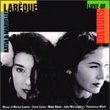
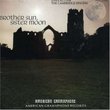
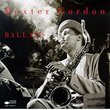

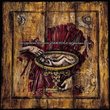



![Across The Universe [Deluxe Edition]](https://nationalbookswap.com/cd//m/51/1251/1241251.jpg)
